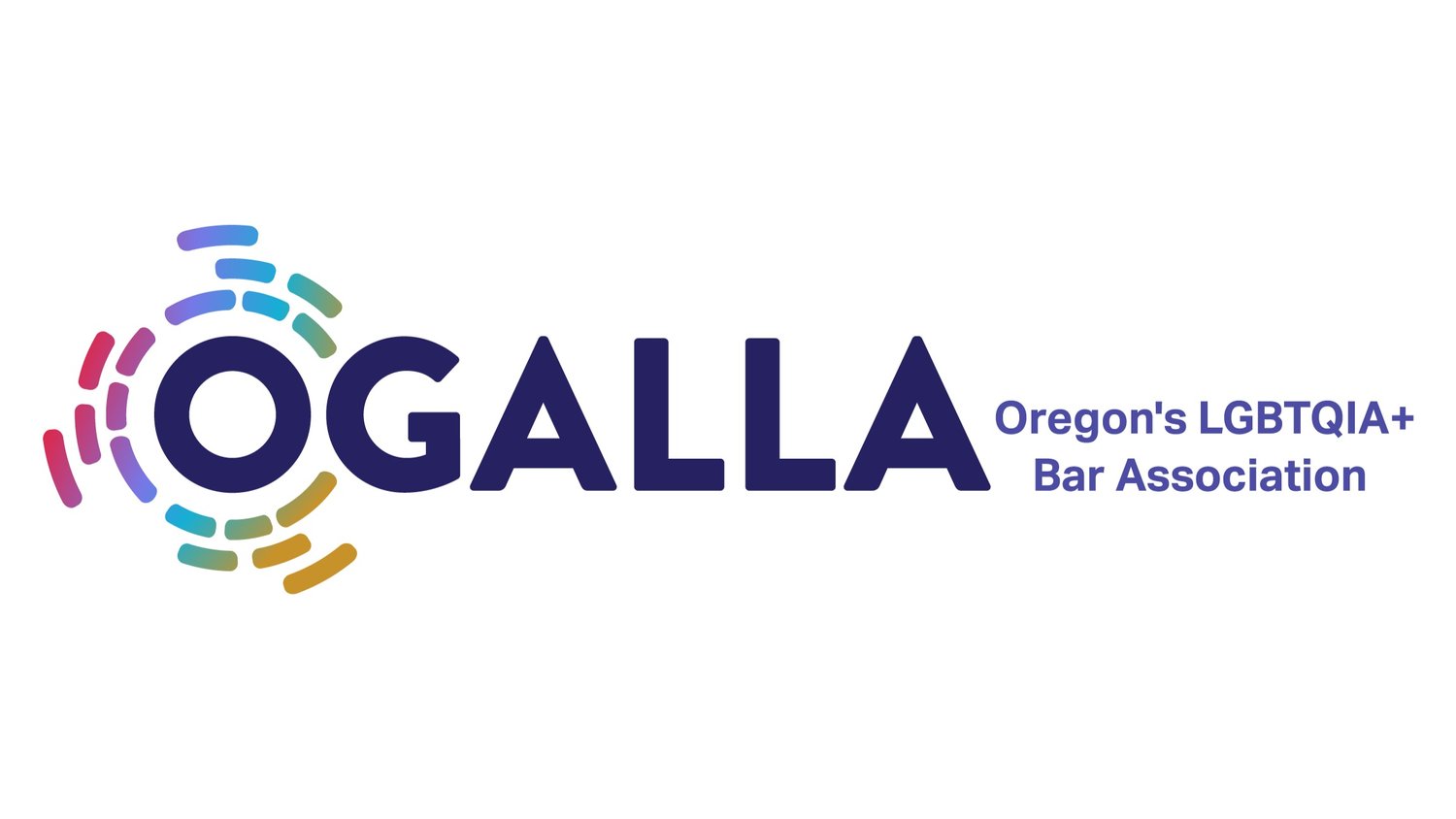Statement on the Decision in 303 Creative LLC v. Elenis
On June 30, 2023, the last day of Pride Month, the United States Supreme Court issued a deeply concerning decision in 303 Creative v. Elenis, holding 6-3 in a split decision that the plaintiff (a website designer) has a constitutional right to refuse to provide service to any gay couple seeking a custom website for their wedding. This decision, which elevates personal religious belief over civil rights laws, was issued one day after the Court's decision in Students for Fair Admissions v. Harvard University striking down race-conscious college admissions policies. In both cases, the conservative majority of the Court abandoned decades-old precedent to hold that legal rules designed to protect disfavored groups and correct the long history of discrimination in our country were unconstitutional.
OGALLA – Oregon’s LGBTQIA+ Bar Association condemns both decisions.
The Colorado civil rights law at issue in 303 Creative prohibits businesses that choose to serve the general public from discriminating against customers on protected grounds, including sexual orientation and gender identity. Oregon has a similar public accommodations law. The plaintiff – a website design business and its sole member, Lorie Smith – were represented by Alliance Defending Freedom, an organization that the Southern Poverty Law Center has designated as a hate group. Smith preemptively and strategically sought an injunction in federal district court that would prohibit the state from enforcing Colorado’s public accommodations law before her business was even operational, and when no same-sex couple had ever asked her to create a custom wedding website. Thus, unlike the 2018 Supreme Court case involving the same state law, Masterpiece Cakeshop v. Colorado, the only individual who could claim to be directly affected by a ruling in this case was Smith: No gay or lesbian couple could appear as victims of her discrimination.
In Elenis, first the district court and then the U.S. Court of Appeals for the Tenth Circuit decided the constitutional issue that Smith raised – based on her First Amendment right against compelled speech in violation of her religious belief – and rejected her arguments. But the Supreme Court reversed, holding that because the parties had stipulated that Smith’s wedding websites "involve her speech," any civil rights law that would require her to create wedding websites for gay couples would necessarily require Smith to express ideas or beliefs with which she disagreed, contrary to First Amendment cases like Boy Scouts of America v. Dale, 530 U.S. 640 (2000) (Boy Scouts did not have to hire a gay activist), and Hurley v. Irish-Am. Gay, Lesbian & Bisexual Group of Boston, Inc., 515 U.S. 557 (1995) (state could not force organizers to include LGBT participants who wished to hold an LGBT banner in the Irish American parade). The Court broadly described those cases as prohibiting states from compelling speech and reasoned that, if it were to agree with the Tenth Circuit that Smith was not entitled to an injunction, all manner of artists and others hired to create speech could be forced to make statements that violate their beliefs. In reaching that conclusion, the Court rejected Colorado's argument that its public accommodations law regulated conduct and would only incidentally burden Smith's freedom of expression.
The dissent, authored by Justice Sotomayor, decried the majority's turn away from the long line of Supreme Court cases that have uniformly held that discrimination has no place in the public marketplace and that restrictions on discriminatory conduct, whatever its motivation, are both constitutional and consistent with public policy. As the dissent emphasized, the Court's reliance on Dale and Hurley to punch a hole in this long-standing precedent is problematic. Those cases involved nonprofit, expressive associations, not commercial activity in the public marketplace, and the Court in those cases "stressed that the speech burdens in those cases were not incidental to prohibitions on status-based discrimination because the associations did not assert that mere acceptance of a member from a particular group would impair [the association's] message." As the dissent made clear, there is a profound difference between having the freedom to choose what to say on one’s own behalf and even selectively choosing what commissions to accept as a creative professional, and operating a business that holds itself out to the general public as a purveyor of goods and services. It is only the latter that public accommodations laws regulate, as discrimination in that context is abhorrent to the values of social equality and human dignity.
We applaud Justice Sotomayor for recognizing and voicing the intensely personal harm this decision will have on members of the LGBTQIA+ community:
"Today is a sad day in American constitutional law and in the lives of LGBT people. The Supreme Court of the United States declares that a particular kind of business, though open to the public, has a constitutional right to refuse to serve members of a protected class. The Court does so for the first time in its history. By issuing this new license to discriminate in a case brought by a company that seeks to deny same-sex couples the full and equal enjoyment of its services, the immediate, symbolic effect of the decision is to mark gays and lesbians for second-class status. In this way, the decision itself inflicts a kind of stigmatic harm, on top of any harm caused by denials of service. The opinion of the Court is, quite literally, a notice that reads: Some services may be denied to same-sex couples."
OGALLA agrees with the dissent: The "lesson of the history of public accommodations laws" is that "in a free and democratic society, there can be no social castes. And for that to be true, it must be true in the public market."
